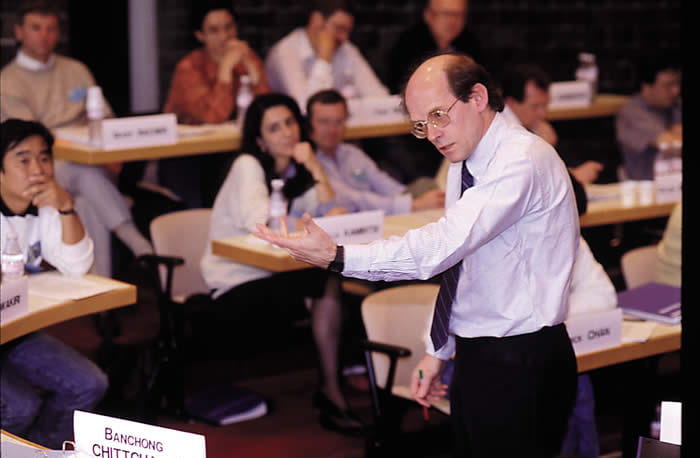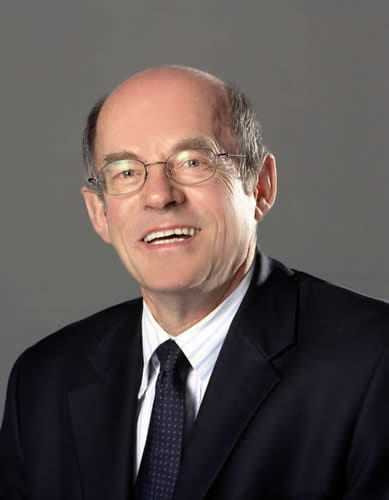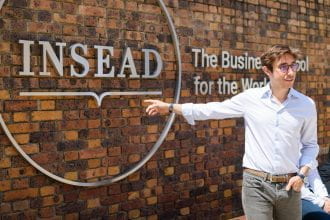Few things define academic excellence and wise leadership more than the capacity to anticipate the future and the talent to produce and share knowledge to influence it.
And then one must act decisively – some might say with passion – on those insights, naysayers notwithstanding.
Those traits define the exceptional career of INSEAD Professor Henri-Claude de Bettignies, in particular in his commitment to management education in the areas of responsibility and ethics and the emergence of the Asia Pacific economies. What enriches those commitments is a remarkable ability to capture and hold the attention and affection of colleagues and students alike and engage them in his passion.
“Henri-Claude has the most wonderful style and his ability to interact with international audiences at a high level sets him aside from the majority of his peers in academia,” explains Patrick Snowball, Group CEO of the Suncorp Group (Australia) who first studied with Henri-Claude in 1997. “His experience, wisdom, guidance and advice are in a class of their own.”
“Henri-Claude, through his classes and his lived example, taught us always to think and seek the greater good, no matter what the passing pressures of the hour,” adds David Evans, MBA ‘00J.
Henri-Claude is inclined to describe his academic explorations as adhering primarily to two tracks: responsibility and ethics on one hand, Asia Pacific and the globalisation process on the other. Those two areas have often been blended in his career and were linked through his interest in the management of change, the subject of his first book in 1969.
As a research assistant at the University of California (Berkeley) in 1961 he worked on a comparative study of managers’ attitudes in 12 countries, including India and Japan. At that time in the management area, comparative research of such a scale was very new.
“My American colleagues had difficulties understanding the data from Japan, so I decided to go to Japan to gauge business attitudes toward the transfer of management practices and to develop some understanding of Japanese management practices,” he explains. His four years of doing research and working in Japan honed his vision of the potential economic power of Japan, well before it was grasped by peers in academia and business elsewhere in the world. And, he mused, could a similar growth process occur in Korea, Southeast Asia or China? The prospect merely sharpened his desire to spend time and study the region. He did.
Henri-Claude returned to France in 1967 and joined INSEAD, intent on sharing his awareness of the dynamics in Japan and Asia and his vision of the future, and keen to contribute to the creation of knowledge about the region. It was a tough sell.
“When I came back and joined INSEAD, I realised two things,” he recalls. “First, that knowledge of the region among executives in Europe was very sketchy and, second, that it was critical for Europeans to be aware of the huge impact that Japan and China were likely to have on the rest of the world and to prepare for it. I tried to influence and encourage INSEAD to acknowledge the importance of preparing MBAs and executives to what I saw coming, but it took a number of years.”
Thirteen in fact. But eventually Henri-Claude’s dream of establishing an academic base was realised with the launch of the Euro-Asia Centre in 1980. Its creation had overcome a minefield of obstacles, from colleagues disparaging the seminal research he and his associates were producing on the region to the common refrain about the lack of funding.
The mere fact of the Euro-Asia Centre is absolute testimony to the indefatigable drive of its founder and champion. Tales abound of Henri-Claude’s peerless networking skills as he was engaging companies (more than 100) in Asia and Europe to support and help finance the Centre. While others would hit the bars on stopovers during flights (in those early days there could be two and three stops between Europe and Asia), he could be found working the phones, building and touching base with his network.
The work of the Euro Asia Centre, its international visibility and recognition, and the experience in Asia gained by Faculty led to the creation of the INSEAD campus in Singapore.
“In my work in and with Asia, I have always been trying to improve the ability of European and Asian business leaders to work together,” he notes. “It is a difficult task. For instance, many Europeans, still today, are afraid of China, and do not know how to work effectively with a Chinese partner.”
Such wariness even today validates Henri-Claude’s vision and the role the Centre did play.
“What we are seeing today is the painful realisation that the centre of the world has shifted and we finally come to realise how China and the Asia Pacific region are critical for our future,” he adds. “And as we see the difficulties of the European Union and the fast growth of the Asian economies, our concern is legitimate: the future role and influence of Europe is at stake. I think INSEAD’s responsibility is to continue to build its experience and expertise in and of Asia. This will enhance INSEAD’s effectiveness in building a global community of leaders and managers working toward the common good of the planet, which includes living together between Europe and Asia.”
Asia was not all that was on Henri-Claude’s mind when he arrived at INSEAD in 1967.
“I was quite unhappy with the way the corporate world was working and I felt we needed to change the mindset of current and future business leaders,” he says. “Given the importance of the enterprise as the main value-creation institution in society, producing jobs, products, services, innovation, taxes, etc., then one effective way to change society and to change the world was to work where power and influence is located, that is with those who run enterprises, managers and leaders, to try to change their attitudes, values and behaviour.”
“From 1968 I started to build a team in the area of organisational behaviour as I believed OB teaching could have an impact on managers’ sense of responsibility, on their values and eventually on their behaviour. In 1980 I started to teach business ethics at INSEAD to MBAs and executives. The ethical compass in decision-making was so clearly missing in our grooming of future or current leaders. Unfortunately, it often seems to be the same today. Can we really “teach” ethics?”
“Still embedded in the neo-liberal model, teaching the gospel of the divine hand of the market and privileging shareholders’ priority among different stakeholders, promoting the use of sophisticated algorithms and emphasising short-term returns, business schools leave little space for ethics. However, it is now well recognised that there is no chance of surviving in the long term if we ignore sustainability or forget responsibility. Change is slowly taking place, pushed by new generations. MBAs today are more aware of the impact of sustainability in the long-term and a small but growing number are concerned about future generations.”
In a recent article on responsible leadership, Henri-Claude asserts that responsibility for establishing and developing a company’s moral compass lies squarely with its leaders.
“These men and women know that we need values to discipline purpose,” he writes. “What is required is nothing less than a paradigm shift. We need to rewire the mindset behind the way we conceive corporations, govern them and manage them. Truly responsible leadership will be able to govern complex systems, and the glue holding them together will be the intangible quality called “trust”.
He notes that among the key messages he shares with business leaders are: “Care for the other, have the long view and give voice to your values”. A challenging agenda, but Henri-Claude assures he can explain “how”.
Tangential to these interests and among his many initiatives, he developed AVIRA, a programme that over 16 years brought 900 business leaders, CEOs and chairs, from 75 countries to enhance their leadership competence from the standpoint, in particular, of responsibility and ethics. As well, he continues to play an important role in the academic areas of ethics/responsibility and in Asian studies. He spent five years (beginning in 2005) with the China Europe International Business School (CEIBS) in Shanghai, where he created and ran the Euro-China Centre for Leadership and Responsibility (ECCLAR). Between 1988 and 2005 he had a joint visiting appointment at Stanford, teaching MBA and executive courses on ethics and on management in Asia. This scratches the surface, but suffice it to say his academic fingerprints can be found around the globe and today he still spends about a third of his time in Asia, sharing the rest between Fontainebleau and Palo Alto.
His impact? Measure it by the people he has touched, influenced, educated and befriended.
“Henri-Claude has become my mentor,” explains Snowball. “He was instrumental in helping my own personal development and that of Norwich Union Insurance during the period 2000 to 2007, when he worked closely with me and my senior team. His input and contribution were invaluable to the success we had in that period. Personally, I cannot get enough of his company.”
Evans, Head, Philanthropy and Values-Based Investing, Asia-Pacific with UBS, points to taking an elective class from Henri-Claude, which would feature extensive discussions on ethical issues in business. “Henri-Claude asked us to see and accept the responsibilities that those of our shared humanity give to us, as we encounter, purely by chance, individuals living realities different from our own. His aim was to thrust creative disruption in settled ways of thinking, pointing always to a wider world.
“I was not surprised to learn that soon after we graduated, he started teaching at an emerging business school in Shanghai, always willing to seek and experience new, broader horizons.”
Henri-Claude’s connections to his colleagues, students and associates often cuts deeper than the professional.
Evans remembers fondly when Henri-Claude “invited us to join him for an evening of excellent wine at his house, accompanied by jazz saxophonist Sonny Rollins playing a little too loudly across the French countryside.”
Given the vast numbers of people Henri-Claude has touched and the change he has inspired, Snowball notes how important it is that his contribution to the success of INSEAD be recognised, in particular in Asia.
“Dinners with Henri-Claude are always highly entertaining, particularly if he gets his hands on the wine list at my expense!” recalls Snowball with a touch of humour, before driving home a more serious point. “He is probably one of the most exceptional people I have ever met. I value him as a mentor and I am proud to have him as a friend. I am delighted that he will be recognised in the construction of a new amphitheatre at the Singapore facility.”
To express our gratitude for Henri-Claude de Bettignies’ unwavering dedication to education and INSEAD and pay tribute to our esteemed colleague, we wish to raise Singapore dollars $ 1.5 million from alumni and friends to name an amphitheatre in his honour at the Asia campus’ new Leadership Development Centre. In this regard, we are delighted to share that an anonymous and most generous benefactor has committed to matching every dollar raised, thereby essentially doubling the impact of all contributions. To find out more, please contact Nynke Fautrat or to make your gift click here.




